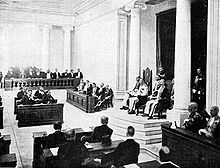Loa Sek Hie
Loa Sek Hie. | |
|---|---|
| Born | 1898 |
| Died | 1965 (aged 66–67) The Hague, the Netherlands |
| Occupation(s) | politician, parliamentarian, community leader, landowner |
| Spouse | Tan Pouw Nio |
| Parents |
|
| Family | Loa Po Seng (grandfather) Tan Liok Tiauw (father-in-law) Tan Tiang Po, Luitenant der Chinezen (grandfather-in-law) |
| Awards | Officer of the Order of Orange-Nassau |
Loa Sek Hie Sia (born in Batavia in 1898 - died in The Hague in 1965) was a colonial Indonesian politician, parliamentarian and the founding Voorzitter or chairman of the controversial, ethnic-Chinese
History
Family and education
Loa was born in Pasar Baru, Batavia in 1898 into one of the city's most prominent families, part of the 'Cabang Atas' or Peranakan Chinese gentry of Java.[1][2][4] His grandfather was the tycoon Loa Po Seng, of Jalan Poseng in Pasar Baru, while his father, Loa Tiang Hoei, served as Kapitein der Chinezen of Pasar Baru.[1] This was a civil government appointment with legal and political authority over the local Chinese community.[4]
Loa's mother, Louise Goldman, came from an
He was educated at the Europeesche Lagere School (ESL) and the Hogere Burgerschool (HBS) in Batavia, then studied commerce at Prins Hendrik School, graduating in May 1917.[6][7]
In November 1917, Loa married Tan Pouw Nio, daughter of Tan Liok Tiauw Sia and granddaughter of Tan Tiang Po, Luitenant der Chinezen, the Landheeren or landlords of Batoe-Tjepper.[8][4] The young couple settled down in the then new, fashionable suburb of Menteng in the outskirts of Batavia.[9]
Colonial career
Loa was appointed to the Gemeenteraad (the municipal council) of Batavia in 1919, and to the Volksraad (the parliament of colonial Indonesia) in 1927.[10][1] From 1928 until 1951, he served on the Executive Board of Chung Hwa Hui (CHH), a center-right political party that advocated change through cooperation with the Dutch colonial state.[1] Loa was also part of the Masonic Lodge of Batavia.[11][12][13]

As parliamentarian, Loa worked closely with Hok Hoei Kan, chairman of CHH, to abolish discriminatory policies against Chinese subjects of the colony.[1][2] He campaigned further for the creation of educational and health institutions for the Chinese community.[1][2] To remedy perceived government indifference, Loa played a leading role in the establishment of Jang Seng Ie (now Husada Hospital).[1] He served on the governing council of the hospital from 1924 until 1951.[1]
Around 1929, he provided a character reference to the government for Liem Bwan Tjie, a well-known architect whose return from overseas had been obstructed due to suspected communist sympathies.[14] Liem stayed at the Loa family residence, and helped remodel it - a project that became the architect's first commission back in the Indies.[15]
In 1940, Loa was appointed by
Revolution
In the feverish atmosphere that followed the end of the War and the start of the
After it became clear that Indonesia was to attain independence, Loa supported the federal movement. Federalism, however, did not gain widespread popular support due to perceived Dutch patronage. With the defeat of federalism by the centralist faction, led by Sukarno and Mohammad Hatta, Loa withdrew from the political sphere.
Emigration and death
Sukarno consulted Loa Sek Hie on issues ranging from Dutch business interests to Freemasonry in Indonesia, but generally ignored the latter's advice.[12][13] Loa left Indonesia for the Netherlands in 1964.[16] He was naturalized as a Dutch citizen in 1965,[16] and died in The Hague later that same year.[5]
See also
- Volksraad, the first legislature in colonial Indonesia
- Khouw Kim An, Majoor der Chinezen, parliamentary colleague
- Hok Hoei Kan, fellow parliamentarian and board member of Chung Hwa Hui
- Phoa Liong Gie, fellow parliamentarian, member of Chung Hua Hui, and political rival
- Peranakan Chinese
References
- ^ ISBN 9813055030.
- ^ ISBN 9799688744.
- ISBN 978-602-424-661-7. Retrieved 27 November 2020.
- ^ ISBN 978-90-90-30249-2. Retrieved 27 November 2020.
- ^ a b BV, DE REE Archiefsystemen. "Overlijdensakte Sek Hie Loa". haagsgemeentearchief.nl (in Dutch). Haags Gemeentearchief. Retrieved 27 November 2020.
- ^ "P. H. S. afdeeling Handelsschool". Het nieuws van den dag voor Nederlandsch-Indië. 9 May 1916. Retrieved 26 March 2018.
- ^ "P. H. S. Afdeeling Handelsschool". De Preanger-bode. 2 May 1917.
- ^ "Familiebericht". Het nieuws van den dag voor Nederlandsch-Indië. 14 November 1917.
- ^ "Woonhuis Loa Sek Hie Kebon Sirih (Jakarta)". zoeken.hetnieuweinstituut.nl (in Dutch). Het Nieuwe Instituut. Retrieved 27 November 2020.
- ^ "Ons doel bereikt!". Het nieuws van den dag voor Nederlandsch-Indië. 16 August 1919.
- ISBN 9065503781.
- ^ a b Utama, Abraham (February 4, 2016). "Antara Freemasonry Indonesia, Soekarno dan Bung Hatta". No. 16.25 WIB. CNN Indonesia. CNN Indonesia. Retrieved 30 September 2016.
- ^ a b Utama, Abraham (February 4, 2016). "Lelaki Indonesia di Freemasonry, Raden Saleh hingga Kapolri". CNN Indonesia. CNN Indonesia. Retrieved 30 September 2016.
- ISBN 90-76643-14-8.
- ISBN 90-76643-14-8.
- ^ a b c "Zitting 1965-1966 - 8514". Registration Agency NBN. Koninklijke Bibliotheek. Retrieved 30 September 2016.
Works cited
- den Dikken, Judy (2002). Liem Bwan Tjie (1891-1966) Westerse vernieuwing en oosterse traditie. STICHTING BONAS Rotterdam. ISBN 90-76643-14-8.
- Haris, Syamsuddin (2007). Partai dan Parlemen Lokal Era Transisi Demokrasi di Indonesia: Studi Kinerja Partai-Partai di DPRD Kabupaten/Kota. TransMedia. ISBN 978-9797990527.
- Lohanda, Mona (2002). Growing Pains: The Chinese and The Dutch in Colonial Java, 1890-1942. Yayasan Cipta Loka Caraka.
- Setiono, Benny G. (2003). Tionghoa dalam pusaran politik. Elkasa. ISBN 9799688744.
- Setyautama, Sam & Mihardja, Suma (2008). Tokoh-tokoh etnis Tionghoa di Indonesia. Kepustakaan Populer Gramedia. ISBN 978-9799101259.
- Stevens, Th (1994). Vrijmetselarij en samenleving in Nederlands-Indië en Indonesië 1764-1962. Uitgeverij Verloren. ISBN 9065503781.
- Suryadinate, Leo (1995). Prominent Indonesian Chinese: Biographical Sketches. Institute of Southeast Asian Studies. ISBN 9813055030.
- Suryadinata, Leo (2005). Peranakan Chinese Politics in Java, 1917-1942. Marshall Cavendish Academic. ISBN 9812103600.
